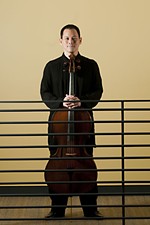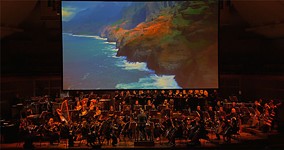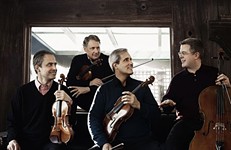Paul Badura-Skoda
Local Arts Reviews
Reviewed by Robi Polgar, Fri., April 4, 2003
Paul Badura-Skoda:
A Craftsman Conversing With MysteryFirst Baptist Church, Sunday, March 23
The first thing was the repeated question asked among the incoming patrons to this A. Mozart Fest Distinguished Artist Concert: "Hands or face?" That is, which would offer a more compelling experience of the performance: Sitting where one could see pianist Paul Badura-Skoda's hands at work on the piano's keys, or sitting where one could see his face as he performed works by Mozart, Schubert, Haydn, and Beethoven? Most people opted for hands over face, but that was to miss Badura-Skoda's expressive visage, sometimes aimed heavenward, eyes shot with something like innocence; sometimes baring teeth during the intricate allegro movements of works. And always such focus, an intensity matched by supreme calm. In performance, Badura-Skoda is like a surgeon: Adept, agile, he makes practically no extraneous movement, allowing each note and chord its purest, simplest airing. The music sounded clean and right -- each element of each piece given its moment of precise, considerate expression and no more. Badura-Skoda swept away all the pretense and clutter of performing, and what was left was glorious music.
The second thing was the phone book. A cushion would not sit securely enough atop the piano stool, so Badura-Skoda opted for an open, upturned Yellow Pages for the precise boost on the stool. Oddly, the man upright -- a 75-year-old Austrian with the measured pace of the classic European: unhurried and easy, with something of a regal air; simultaneously uncomplicated and unfathomably deep -- was not as impressive as the man sitting down. If it was possible, Badura-Skoda appeared larger sitting at the Steinway than he did gently accepting the warm appreciation of the hands-side-heavy house.
The opening work was Mozart's Fantasy in C Minor, K. 475, which Badura-Skoda undertook with no fanfare whatsoever. Instantly the music poured out, powerfully and simply and without more than the briefest of senses that one movement had made way for the next, from the confidence of the opening Adagio, through the playful Allegro, and on through Andantino, Più Allegro, and back to the main theme in the closing Adagio. The piece allowed for sweeping grandeur and plenty of lightness, even a sense of frolic. Schubert's Sonata in A Minor, Op. 42 (D. 845) took grandeur to new heights in the supreme opening Moderato. This time, in keeping with the highly dramatic piece, Badura-Skoda allowed lengthy, dead-still pauses between movements. The stately Moderato, then, was followed by the delicate and light Andante, then two Allegro movements: a teeth-bared attack of the Scherzo and an acceleration of the final Rondo, upon whose conclusion Badura-Skoda flew away from the piano, the final note firing the 75-year-old off the Yellow Pages and face front at the audience, which offered its own ecstatic response.
After the break, the audience was treated to a display of exquisite control for Haydn's Variations in F Minor, Hob. XVII/6, a rolling exploration that climaxed in the lightest, simplest notes one could possibly imagine -- as slow and still and calm as the Schubert's conclusion was intense. This reviewer, sadly, could not stay for the Beethoven sonata that concluded this magnificent artist's performance, which seemed much like witnessing the ongoing, breathtaking conversation between a master craftsman and some mysterious presence, an unseen force that attends the pianist's graceful execution of some of the world's loveliest music.










